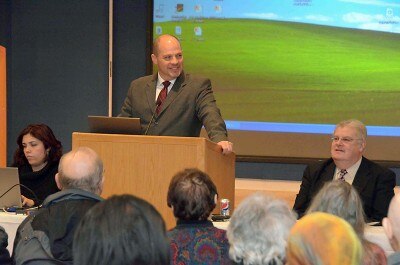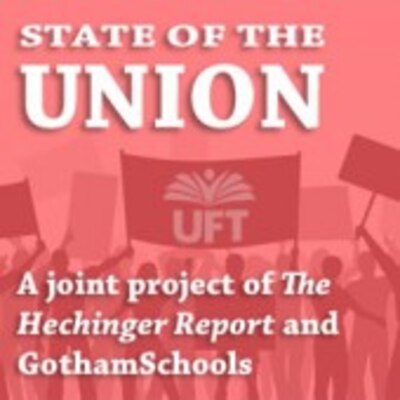
United Federation of Teachers President Michael Mulgrew runs the largest teachers union local in the country, representing the teachers of New York City. Like many teachers union affiliates nationwide, the UFT has been sparring with policymakers over issues such as merit pay, school closures, and charter schools, which pose a threat to union strength and which union leaders argue harm public education. Even as some national experts predict that teacher union power is waning, the UFT has won victories and its political influence remains strong. The Hechinger Report and GothamSchools spoke with Mulgrew at the union’s headquarters near Wall Street in downtown Manhattan about the biggest challenges facing the union and what the future looks like for the UFT.What was the biggest challenge you thought the union was facing when you started this job?
The ideological war on teachers and on public education. It’s pretty simple. We knew that the progress reports of New York City were driving the instructional practices of the schools, which were bad because the progress reports were 85 percent standardized tests. Even though we didn’t have teacher evaluations based on standardized test scores at that point, it was clear to us that the entire school system was becoming about test prep and not about curriculum, not about supporting teachers: Just prepping kids on skill sets that would allow them to do well on standardized tests and keeping the focus of education on test scores, not with developing children holistically.
What is the biggest threat now to the union?
The challenge that this union faces right now is where do we go with our school system. So we have the Bloomberg administration leaving. There’s going to be a huge, seismic shift in the school system. But what does that seismic shift result in?
How do we get teachers ready to do the work of actual education and at the same time, have a hand in creating a new school system where they can prosper inside of it? That’s our greatest challenge as a union. We have to get our contract, the things unions do, but it’s more about public education at this point.

How are you reacting to the demographic changes in the union that, and do you think you need to?
We’re always looking at our membership. We’ve seen a shift in the delegate assembly. We’re much younger now, and the union itself is in a generational change phase. It happens every 20 or 30 years, and it’s happening right now.
Our fear is that we’re losing more teachers, because the people who are coming into the profession with different experiences are disillusioned rather quickly, and I know that we can’t be as successful as we want to be, both as a union and a school system, if that keeps going on. Because if people are leaving your profession because they don’t want anything to do with it anymore, that’s not good for the union or the school system.
So we’re going to have to target getting more support for teachers. We want a career ladder for teachers that starts when they’re brand new that gets them more support on the practices—classroom management is the biggest issue for any new teachers—moving all the way up to a master teacher—someone who can help the new ones. That’s where we’re going to go. That’s been a contract demand we’ve had throughout this contract fight.
Do you think it’s true that the new generation of teachers are looking for different things?
I don’t think anyone walking into the workforce these days is thinking I’m going to do this single job for 30 years. I don’t think that’s unique to teaching. And you have people coming in from other professions. We’re getting more people from other industries than ever before. We’re not getting a large group of teachers directly out of ed schools coming into education. We’re having more and more people where this is their second or third career, which brings different experiences but also different expectations.
In New Haven, they created a teacher evaluation, they’ve been involved in school turnarounds where they fired half the teachers, are they the model that unions will need to follow, and if not them then who?
Is there any one local? No, they’re all different. A lot of school systems right now, you need to customize your school system to where you want to go in terms of changes and things you want in the future.
What I see is New York City is growing, but I see a lot of large big city school districts that are actually diminishing in population. So you have the Philadelphia thing right now, you have the fiasco in Kansas City a couple of years ago. But the one constant is who has figured out how to deal with the high-needs, struggling student population.
That’s where I’m focusing this union on, because we have a very large portion of our student population fits that. You can do charter schools, closing schools, but guess what, we still have those same results for those students. We have not moved the needle. And that’s where I think the union that comes up and gets a partner and starts figuring that out, that’s the union who I believe is the model people should be looking at.
Are there other locals you’re looking at?
Cincinnati. You know I’ve been back and forth to Cincinnati.
I taught for a long time. Half of my time outside of the classroom was spent trying to find services for my kids—I only taught at risk children in high school. I would run around trying to find this family’s horror story, and I would try to get the guidance counselors, and social workers, and it was so piece meal. It took up an immense amount of my time as a teacher. If I could have spent that time—if those things were at the ready for me, and there was a way to get those things for those students—I could have spent more time in diagnosing their educational needs and designing the instructions. They would have better student outcomes. That’s how I see it the high-need, big city children. That’s where we have to go.
What new responsibilities will teachers have under the system you envision?
The teacher, I would love to see more responsibilities about working in collaboration with each other. Having teachers sit and plan together has proven to be highly successful. Teachers right now are extremely isolated. Some of them like their isolation, but we do know that when we have teacher sit and work with each other it makes them stronger teachers and it also gives them more of a sense of mission in terms of the children. Right now they’re completely isolated and just doing paperwork all day.
Next fall, when most probably a Democratic candidate will be elected for mayor, how does the political dynamic change?
What I think is the next mayor is going to need a lot of help on a lot of different issues. Yes, we’re the teachers union, but we’re involved in a lot of different issues in the city and the state. And we’ll be there. We have a history, we’ve always done it. Albany has figured out that we’re a very good partner to work with. I would like the same relationship with City Hall.
I became president and how fast till we were at all-out war? When the mayor went to Washington, D.C. to brag that his goal was to close 200 schools in New York City.
Did you start out optimistic?
I’m always optimistic. I still am! I’m still trying to get [teacher evaluations] done before we have to go to the state, and according to them it’s to my advantage to go to the state, so I say let’s get this done. We want to get things done, but we want to get things done that are going to work.
This interview has been edited and condensed for clarity and space.
